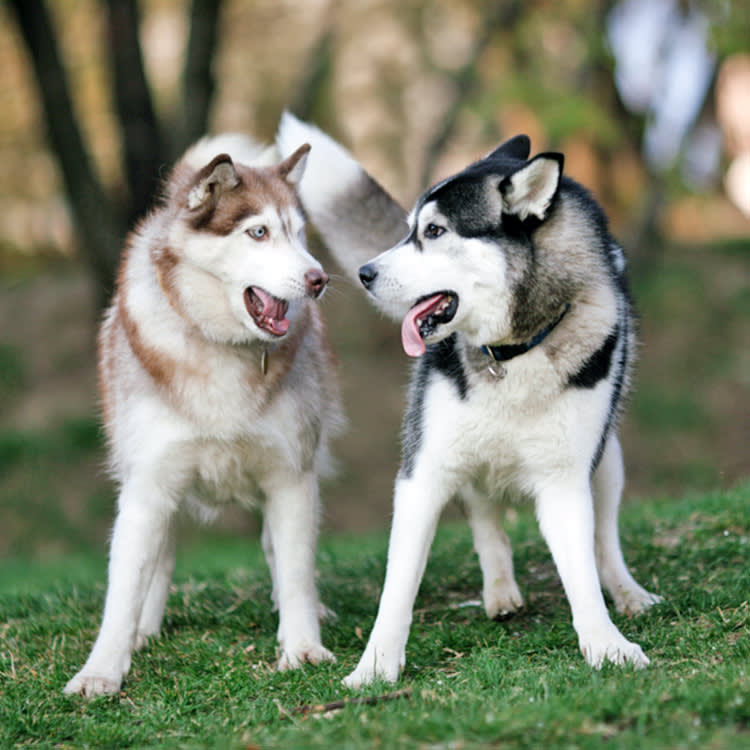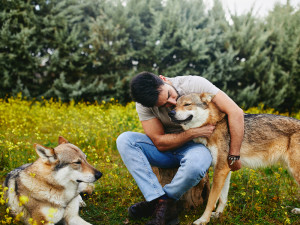Why Do Huskies Love to ‘Argue’ With Each Other (and Their Humans)?
Find out what all those “roo-roo-rooos” are really about.

Share Article
If there’s one dog breed that would have absolutely thrived on a high school speech-and-debate team, it’s the Siberian Husky. If the TikTok videosopens in new tab all over my feed are to be believed, you’d be hard pressed to find a more argumentative dog breed. Whether they’re trying to rile us up, avoid bathtime, or put a canine sibling in their placeopens in new tab, it seems that these pups love nothing more than to talk back.
There’s a reason so many of these videos go viral; they’re adorable. But how deep does this behavior go? Are these furry rhetoricians actually trying to tell us something when they break out their howly, yowly voices and start spouting off “roo-roo-roooo”’s? Or are they just blowing off steam? It turns out, the answer could be a little of both.
Why are Huskies so “talkative”?
As with so many topics related to dog behavior, Huskies’ love for a good argument stems from a mixture of genetics and expressiveness.
They’re descended from sled dogs
If you’re a Husky, that means your ancestors were sled dogs — and if you’re going to pull a human and their luggage through the snow, you’ve got to be good at communicating. Because of this, Huskies are genetically predisposed to being, well, we’ll just call it “more vocal” than other dogs.

According to Dr. Berkcan Yanar, a licensed veterinarian and reviewer at PawsRank, Huskies descended from Siberian Chukchi sled dogs, which were bred for long-distance team pulling — often in remote and unforgiving environments. Because of this, Dr. Yanar says, “They became acquainted with a wide variety of howls, whines, yodels, and ‘talking’ noises with which to respond back to each other and their masters.”
All of that barking allows the mushing team to navigate harsh surroundings as safely and collaboratively as possible, even through conditions that compromise visibility. So, when your Husky keeps nagging at you during a road trip, consider it their version of backseat driving.
They’re genetically close to wolves
We all know that dogs come from wolves, but as someone who lives with a Havanese mix, I’ll be the first to confirm that some dogs hew closer to that legacy than others.
According to Dr. Julie Hunt, veterinarian at Embrace Pet Insuranceopens in new tab, Huskies are thought to remain particularly connected to their pack-minded ancestors — “and wolves are very talkative, frequently vocalizing in order to communicate with their pack.” Because of this, Huskies might howl, yip, and whine as a way to express themselves. In other words, you might say they’ve mastered the art of emotional honesty.
They just… have a lot of feelings
Huskies are very social and intelligent, which means they tend to be quite… expressive.
“Huskies have also been known to bond with their human family and other dogs quite intensely,” Yanar says — and that means letting their loved ones in on their every mood.
“Because they have a pack mentality, barking is an instinctive way [for Huskies] to express excitement, annoyance, boredom, or the desire for attention,” Yanar says. “It’s not uncommon for a Husky to ‘talk back’ when told to do some chore or other that it doesn’t especially care about doing, or to put on quite a show of bellowing when it feels left out or ignored.”
As melodramatic as these displays might seem, Yanar adds, “they’re actually a pretty good reflection of how emotionally sensitive and socially aware this breed is.” And, if nothing else, they’re also very cute.
What does it mean when Huskies “argue”?
Because we’ll never be able to Magic Schoolbus our way into a Husky’s mind, Hunt says, “The real meaning of Huskies’ individual vocalizations may remain a mystery.” That said, she adds, “it is safe to say that they are expressing their wants, needs, thoughts, and feelings to the animals and humans around them.”
Sometimes, a Husky might be “arguing” in response to other dogs’ vocalizations, or to noises in their environment like sirens, doorbells, or human voices, Hunt says. (We’ve all seen those videos where dogs sing along to songs with surprisingly accurate pitch, right?) Sometimes, Huskies might even try to mimic human voices. And if you tend to make a big fuss whenever your dog does the cute arguing thing, there’s also another possibility: Your Huskies might be “arguing” because they know it amuses you.
“When interacting with their owners, Huskies may learn that vocalizing gets them a treat or additional attention,” Hunt says, “and this further reinforces the vocal behavior.” If you tend to pick up a treat (or your camera) every time your dog breaks out his cutest arguing voice, you might be encouraging his theatrical flair.
Is this behavior ever aggressive?
To put it simply, probably not. If your Husky tends to “talk back” every time you tell them it’s time for a bath, they’re likely just trying to communicate. “Behaviorally,” Yanar says, “this noise is a way for Huskies to figure out what they like, establish roles in the social hierarchy, or simply engage with the people and animals around them.”
As with many other aspects of doggy behavior, it’s important to check their body language for more clues.
If your dog is feeling frisky in a good way, you might notice:
Loose posture
Relaxed mouth, possibly with dangling tongue
Floppy ears
Gently wagging tail
If your dog is feeling stressed or agitated, you’ll more likely see:
Stiff posture
Tight lips, or mouth drawn back in a stiff, almost clown-like smile
Ears standing up or pinned back
Tail sticking up
In most cases, Yanar says, Husky “arguing” is “more of an expressive, emotional form of communication” than a sign of aggression. “Consider the case of when you command a Husky to get off the couch, and it growls or howls at you,” Yanar says. “It’s not necessarily being disobedient in the traditional sense. They’re using their voice as a means of frustration or resistance, like when a child protests when being instructed for bedtime.”
During doggie playtime, Husky “arguments” could be one way to socialize, or even settle minor disagreements about resources like toys and space, Yanar adds. “You might be listening to loud barking that sounds intense, but if you observe carefully, you’ll typically see loose body postures, play bowing, or wagging of the tail, all pointing to the fact that it’s actually not an argument but more of a discussion.”
In other words, if your Husky seems to be having a good time arguing, you’re probably safe in assuming they won’t try and settle it with violence. As we’ve all seen, most of them are big fans of using their words.

Laura Bradley
Laura is a New York-based experienced writer and mom of two rescue pups. Her work has appeared in Slate, Vanity Fair, Daily Beast, The Washington Post, The Atlantic, Yahoo! News, Vulture, Grazia Magazine, and more. When she is not writing or walking the pooches, you will probably find her in the community garden.
Related articles
![cute mutt / mixed breed dog]()
Why Mixed-Breed Dogs Make Incredible Pets
On National Mutt Day, here are nine reasons you should adopt a mixed-breed dog.
![Wolfdog (Wolf/Dog Hybrid) don't always make good pets]()
Do Wolfdogs Make Good Pets?
Experts say these hybrid animals should be wild and free.
Every Dog’s Biggest Need, According to Their Breed
Because those animal instincts run deep.
![A person with a dog in front of a starry backdrop]()
What Dog Breed Are You Based on Your Zodiac Sign?
Find out if you’re more of a Chihuahua or maybe a Golden Retriever.
What Do Puppy Sounds Mean?
Besides being ridiculously cute.




